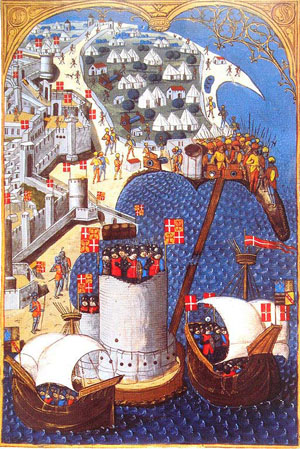The Christian Fight for Liberty at Rhodes

The need for men and women of uncommon courage, dedication, perseverance, and self-sacrifice recurs over the centuries. As we read about the mighty deeds done in past eras we are inspired to imitate the heroic behavior of those brave hearts who went before.
In every age people are challenged. They are forced to make choices that will affect their families and nations for generations into the future. The need for men and women of uncommon courage, dedication, perseverance, and self-sacrifice recurs over the centuries. As we read about the mighty deeds done in past eras we are inspired to imitate the heroic behavior of those brave hearts who went before. Christian culture has been threatened many times. Now, when our faith is often mocked and the churches seem unwilling to pursue any courageous course, God is again calling His saints to sacrifice and dedication in the defense of right.
Who Were the Knights Hospitaller?
It was at the Greek island of Rhodes where some of the most inspiring battles for liberty ever took place. The gripping story begins with losses by Christian knights Hospitaller. Their order had originally been formed to provide lodging and assistance to Christian pilgrims visiting Jerusalem. Lawless Muslims often robbed, raped, or killed these travelers despising them as infidels to be abused. The Hospitallers soon became defenders of these travelers thus defining themselves as the sword of Christ in hostile lands.

Eventually they were driven from the Holy Land and retreated to a strategic island. This island of Rhodes was an excellent choice being was located off the southwest coast of Turkey, the old Ottoman Empire. From this location these European knights could slow, or hopefully stop, the movement of Muslim pirates or armies on their way toward western Europe. As a forward operating base Rhodes was an indispensable anchor point for the Christian defense. It was from this island that the knights fought endless high-seas battles against their deadly foes.
Preparing for Battle
Arriving at Rhodes in 1309 AD the knights began immediately digging in for eventual attack. It was an immense project to prepare adequate defenses. The Muslims were capable of raising armies upward of 100,000 men. With these kinds of numbers it was believed they could carry any fortification the knights might erect. However, understanding they had a Christian duty to stop these armies before they reached England, France, Germany, Spain and Portugal the knights Hospitaller worked ceaselessly to build fortifications of uncommon strength.
They spent decades constructing the heaviest, highest stone walls possible around the entire perimeter of the island. Rock was mined outside the walls forming a formidable foss, a ditch, around 100 feet wide and 40-60 feet deep. The works were so massive, the foss so large, that the knights could think of no way the Muslim armies could ever gain entry to the fortress. At the same time, they also knew that a determined enemy with the numbers of fighters the Muslims could raise, would likely be able to get past any defenses.
Defending Christendom
All of this work at Rhodes, the building of the fort and the constant patrolling of the Mediterranean for pirates was inspired by a belief that Christian civilization, what they called Christendom, was worthy of defense. European families expended substantial wealth and lost thousands of their sons in these battles. There was a substantiated fear in Europe that should the Muslims gain ground in their land there would be no way to stop their ravaging advance. Christian civilization would be lost. The message of the gospel would become illegal throughout the known world. These were matters that drew Christian men to fight. They were willing to expend and be expended, as the apostle wrote, in a cause greater than themselves. The liberty of a continent was defended on those parapets.
Together in the Fight
When we read about that army of knights and soldiers we discover that they were drawn from all across Europe, from the nations mentioned above and more. There was unity behind this extended war that ran in the face of the internal conflicts among those same nations. This reminds me of the story of Deborah and Barak fighting Sissera found in Judges 4-5. In that case the call went out from God through the prophetess that the two tribes of Naphtali and Zebulun must send ten-thousand men to fight Sissera’s army (Judges 4:6). Later, after the victory, Deborah sings a song of celebration (Judges 5:1-31). There we find her mocking, condemning, words concerning the other tribes of Israel who did not come out to fight. Reuben, Dan , and Asher were disparaged in her song for refusing to join the conflict (Verses 15-17). Even though they were not specifically told by God to join in the war against Sissera, they were expected to volunteer, grab their gear, and go join the righteous army. A failure to do this was a failure to serve God rightly.
We can see those European nations of the 14th and 15th centuries understood this principle of unity in the fight, and lived it. It is an example we may use to our advantage when the cause is right. Christian men may, must, join together sometimes to defeat a determined enemy. Warfare, under Biblical moral principle, can be righteous, and may extend a call for Christian men to defend their society.

We may also admire those knights for diligence in a prolonged conflict. They worked tirelessly on their fort for one-hundred twenty-five years before it sustained them through its first attack.in 1444 AD. They re-built and maintained their defenses until 1522 AD when it fell to Suleiman the Magnificent. The knights successfully fought off two major sieges. Histories from the time record wonderful feats of personal bravery. Those knights were often living pictures of courage in the battle. At one point, deAubusson, the supreme military commander on Rhodes, charged up a ladder, was pushed off, regained the top, and led his few available men in a rally that saved the fort from certain defeat. Falling from multiple wounds another soldier covered him with his shield and fought back the pressing enemy, saving deAubusson’s life.
Christian Courage
These kinds of stories remind us of the Biblical accounts of courageous men who advanced Christ’s kingdom under impossible situations. David expressed that he had killed the lion and the bear and would likewise kill the Philistine, Goliath. Goliath had four giant brothers so David put five smooth stones in his pouch. That was courage. Christian people can use David as an example. There are times when Christian people need to be courageous. Sometimes we need to fight for the right things even though the odds against success appear to be all on the other side. The knights at Rhodes understood this principle and left us with stories of personal fortitude still inspiring five-hundred years later.
Men who know they are in the right based on Biblical principle, can have the resolute spirit to work under threat of defeat, knowing their cause is worth the effort, win or lose. They press forward in doing good for the cause of Christ’s civilization. They have strength for the fight. They are kingdom builders. They are seeking first the kingdom of God and righteousness. May we imitate their obedience.
For Christian Civilization,
Don Schanzenbach 11- 17 -13
How can we revive Christian courage in our day? Comment below and join the conversation.
Leave a Reply